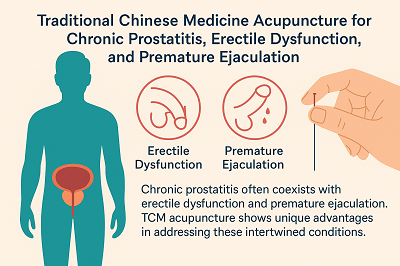Traditional Chinese Medicine Acupuncture for Chronic Prostatitis with Erectile Dysfunction and Premature Ejaculation
Chronic prostatitis is a common condition affecting the male reproductive system, often marked by pelvic discomfort, urinary disturbances, and sexual dysfunction. When it occurs alongside erectile dysfunction (ED) and premature ejaculation (PE), a vicious cycle may develop, making treatment more challenging. In such complex cases, Traditional Chinese Medicine (TCM) acupuncture offers distinct therapeutic advantages.
Modern studies have shown that acupuncture helps regulate neuroendocrine function, improve local microcirculation, and ease psychological stress. It offers a holistic, low-risk, and long-term solution for chronic prostatitis with sexual dysfunction, often outperforming drug therapy alone in symptom relief and quality-of-life improvement. As such, it has become an integral part of comprehensive urological care in modern medicine.

I. TCM Understanding of Pathogenesis
1. Chronic Prostatitis in TCM
In TCM, chronic prostatitis falls under categories such as Jing Zhuo (seminal turbidity), Bai Yin (white discharge), and Lin Zheng (stranguria syndromes). Its development is primarily attributed to damp-heat in the lower burner, blood and qi stagnation, and kidney deficiency.
2. TCM Pathogenesis of ED and PE
Kidney Essence Deficiency: The kidneys govern reproduction. A deficiency in kidney essence leads to poor nourishment of the zong jin (ancestral tendons), resulting in weak erections or involuntary ejaculation. Symptoms may include lower back soreness, tinnitus, hair loss, and fatigue.
Liver Qi Stagnation: The liver meridian encircles the genital region and governs emotional regulation. Emotional depression leads to stagnated liver qi, impeding blood flow to the zong jin, causing erectile issues and premature ejaculation, often tied to psychological stress.
Heart and Spleen Deficiency: Excessive overthinking harms the heart and spleen, resulting in poor blood and qi generation, which deprives the reproductive organs of nourishment. Symptoms include weak erections, PE, palpitations, insomnia, and poor appetite.
3. Interrelation Between Prostatitis and Sexual Dysfunction
There is a complex bidirectional relationship between prostatitis and sexual dysfunction. Chronic inflammation can impair smooth muscle function in the corpus cavernosum, leading to ED. Persistent perineal discomfort may also cause pelvic floor muscle tension, triggering early ejaculation. Conversely, the anxiety and hormonal imbalances from sexual dysfunction can worsen prostatic congestion and inflammation, creating a difficult-to-break pathological cycle.
II. Theoretical Basis of Acupuncture Treatment
TCM meridian theory forms the foundation of acupuncture treatment. The Liver meridian (Jueyin of the foot) wraps around the genitals, while the Kidney meridian (Shaoyin of the foot) travels through the spine and connects with the bladder.
The Conception Vessel (Ren Mai) begins in the uterus and descends to the perineum, and the Governing Vessel (Du Mai) runs along the spine. These pathways create a “Kidney–Reproductive Chamber–Zong Jin” functional network. Stimulating specific acupoints on these meridians helps regulate the flow of qi and blood to the prostate and reproductive organs.
III. Acupuncture Protocol for Chronic Prostatitis
1. Core Acupoint Strategy
Main acupoints focus on the Du and Ren meridians, Heart, and Kidney channels:
- Calming the mind: Baihui (DU20), Yintang (Extra), Neiguan (PC6)
- Tonifying kidney and securing essence: Shenshu (BL23), Taixi (KI3), Guanyuan (CV4), Dahe (KI12), Zhongji (CV3)
- Harmonizing Heart and Kidney: Xinshu (BL15)
2. Pattern-Based Point Selection
- Damp-heat in reproductive chamber: Yinlingquan (SP9), Ligou (LR5) — clear damp-heat from lower burner.
- Liver qi stagnation with kidney deficiency: Taichong (LR3), Zhishi (BL52) — soothe the liver, nourish the kidney.
- Disharmony of heart and brain: Sishencong (Extra), Shenting (DU24) — calm the mind and regulate brain-heart connection.
- Kidney deficiency with blood stasis: Sanyinjiao (SP6), Xuehai (SP10) — promote blood circulation and regulate the three yin meridians.
- Spleen and kidney deficiency: Zusanli (ST36), Pishu (BL20) — tonify spleen qi, nourish post-heaven essence.
3. Specific Point Combinations
- ED Protocol – "Shangxing–Shenmen–Mingmen–Zhongji":
- Shangxing (DU23) awakens the mind,
- Shenmen (HT7) calms the spirit,
- Mingmen (DU4) strengthens kidney yang,
- Zhongji (CV3) revives sexual function.
PE Protocol – "Yintang–Xinshu–Shenshu–Jinggong":
- Yintang (Extra) calms the mind,
- Xinshu (BL15) clears heart fire,
- Shenshu (BL23) stabilizes the essence gate,
- Jinggong (Extra) is an empirical point to prolong ejaculation latency.
IV. Precautions and Lifestyle Recommendations
1. Contraindications
While acupuncture is generally safe, it should be avoided in individuals with severe bleeding disorders, local skin infections, extreme fatigue, fasting state, critical illness, or unstable medical conditions.
2. Adverse Reaction Prevention
Possible side effects include dizziness or minor hematoma. Practitioners must use sterile, single-use needles and follow strict disinfection protocols.
3. Lifestyle & Self-care Tips
Diet:
- For damp-heat types: avoid spicy, greasy foods and alcohol; favor mung beans, winter melon, and cooling herbs.
- For kidney deficiency: eat black sesame, walnuts, and Chinese yam.
- For blood stasis: consume hawthorn and rose tea to improve circulation.
Exercise:
- Engage in 30 minutes of aerobic activity daily (brisk walking, swimming).
- Practice Kegel exercises (3 sets of 15–20 reps daily) to strengthen pelvic floor muscles.
- Avoid activities that put pressure on the prostate (cycling, horseback riding).
Mental Health:
- Practice mindfulness and meditation to reduce anxiety.
- Seek cognitive-behavioral therapy if needed.
Behavioral Adjustments:
- Avoid prolonged sitting (stand up every 45 minutes), don’t hold in urine, maintain regular sexual activity (1–2 times weekly), and avoid interrupted intercourse or prolonged abstinence.
Conclusion
Acupuncture, grounded in TCM theory and syndrome differentiation, provides a unique and holistic approach for treating chronic prostatitis with ED and PE. By stimulating multiple strategic acupoints, it addresses both inflammation and sexual dysfunction simultaneously, producing a synergistic therapeutic effect.
However, limitations exist. Individual responses to acupuncture can vary, and standardized treatment protocols are still lacking. Large-scale studies are needed to further validate optimal point combinations and stimulation parameters. Therefore, combining acupuncture with herbal medicine remains essential.
The Diuretic and Anti-inflammatory Pill, for example, is an effective TCM remedy that complements acupuncture. It works by clearing heat, detoxifying, activating blood circulation, strengthening the spleen, and eliminating dampness—targeting both infection and inflammation for a comprehensive and lasting recovery.



